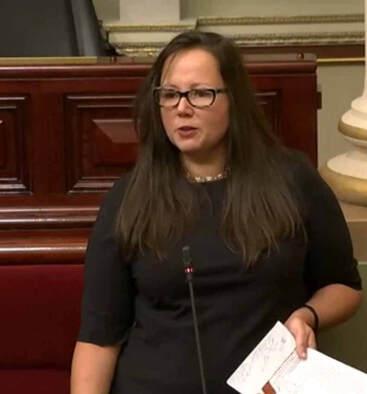 Watch Harriet Shing deliver her speech. Video: The Age
Watch Harriet Shing deliver her speech. Video: The Age By Harriet Shing
IN RISING to speak to this bill today, I do so on a deeply personal basis, because I want to talk today of the impact of being different and of being other and of starting out in a world where you think that there is nothing wrong with you before discovering, firstly, that you are different, that you are other; and secondly, for too many of us, there comes a point at which it occurs to us that our difference is wrong, that we live in a world that is generally yet to come to the point where we are accepted for exactly who we are.
It is very, very easy to say that we are not broken and that we do not need to be fixed. These are important messages, particularly from our allies, particularly from our supporters and particularly from our leaders, including my very dear friend and very great supporter and ally, the Premier, Daniel Andrews, from so many members of this government and from so many members of the opposition who privately acknowledge to me the importance and necessity of a bill just like this—in the form that has been presented, unamended—to recognise the pain and the trauma and the hurt of victims and survivors.
It is easy to come up with those words in the same way that it is easy to then try to believe that we are in fact good enough to occupy an equal place in the world, that we are deserving of love without qualification and that we ought not be subjected to the disadvantage that comes from a world which is based in an inherent recognition that same-sex attraction and gender diversity are too difficult and too uncomfortable to incorporate, particularly into traditions and institutions which have preached, which have encouraged, which have coerced and coaxed and ultimately used it as a tool of violence to break us.
It is all too convenient for people who oppose this bill to start from the position that they do not have anything against LGBTIQ people like me. It is this cognitive dissonance, it is this doublespeak, that does such a disservice to the pain and the disadvantage, the discrimination, the harassment, the vilification that we face every single day, and this is the cause and this is the root of shame.
I want to touch on shame today because shame is at the heart of the need for this legislation, and it is a recognition of this shame that has brought about the importance of a bill like this. Shame comes in so many layers, and people who grow up in a family or in a faith that says that they are not good enough, that they are wrong—that we are wrong—that says in fact that love is conditional upon us either denying who we are or agreeing to change, or in certain tragic circumstances, too many of which I am aware of personally, are forced to change.
There will always be reasons for those who refuse or are unable to stand up in support of a bill like this to say that it is not good enough, that the needs of competing priorities and interest groups or faith leaders or psychologists, psychiatrists, medical practitioners or health service providers need to be considered because we are not there yet. What that does is create a status quo that enables an inherently damaging and hurtful discrimination to continue, that enables our shame to continue.
We deserve better than to have to beg Australia for the right under marriage legislation to be with and to marry and to have our relationships recognised at law on an equal footing. We deserve better than to have members from the Coalition abstain from a vote and thus mean that their names are not recorded as supporting or opposing this bill. The public record does not reflect the names of coalition MPs who did not attend the vote, and it is for this reason that I am going to read those names onto the record now:
Neil Angus, Member for Forest Hill,
Brad Batten, Gembrook,
Gary Blackwood, Narracan,
Roma Britnell, South West Coast.
Neale Burgess, the member for Hastings;
Matthew Guy, the member for Bulleen;
David Hodgett, the member for Croydon;
Cindy McLeish;
David Morris;
James Newbury;
Michael O’Brien;
Richard Riordan;
rad Roswell;
Ryan Smith;
Tim Smith;
David Southwick;
Louise Staley;
Bill Tilley;
Bridget Vallence;
Nick Wakeling;
Kim Wells;
Emma Kealy;
Steph Ryan;
Peter Walsh;
Tim Bull;
Tim McCurdy;
Danny O’Brien
Shame on those who would not stand and actually take a position. Shame on you for lacking the guts and the spine and the courage and the bravery that sits in the little fingers of those victims and survivors for whom this bill is so important. I look forward to seeing in fact that you opposite will have the guts, will have the intestinal fortitude to stand in your place and to oppose this bill or otherwise to support it. Know the strength of what you can deliver on the public record.
I look forward to seeing that if you oppose this bill, you never dare march at Pride ever again. You will be our shame.
I commend this bill to the house.
The MLC for Eastern Victoria, Harriet Shing is the first openly gay woman in the Victorian Parliament. This is an edited transcript of her speech in the Legislative Council on a bill which makes it illegal to try to suppress or change another person’s sexuality or gender identity. The bill passed the Legislative Assembly 50-0 after Coalition MPs abstained from voting. It passed the Legislative Council 27-9 on February 4.